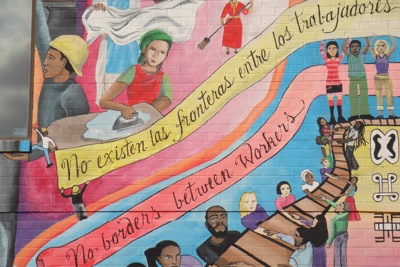
I am a member of a women’s group called Woman, Action and Change. We are part of Tenants and Workers United of Northern Virginia. We are predominantly Latina immigrant and migrant women from all parts of Latin America. Our members include Mexicans, Dominicanas, Salvadorans, Guatemalans, Chileans, Argentines, many women from many countries. I am from Nicaragua. I have been living continuously in the United States for only 16 months.
When the group selected me to talk about domestic work, I was worried about how to approach a subject of which I am not an expert and then I remembered an expression of José Ortega y Gasset, a Spanish philosopher, who said: “I am myself and my circumstances” so I decided to approach it from my own experience.
I’m from Nicaragua. My mother came from a poor farming family. As a single mother she raised 5 children alone. My mother was an entrepreneur. She had a store and all of us had to work ever since we could remember. I grew up with the image of a strong, working woman, and in an environment where domestic work was part of an effort to sustain the family. I grew up working and studying, got married and, as my mother did, I took care of my home and my children as part of my duties to support and protect my family.
Antecedents
As we all know, in developing countries, domestic work has been used as a mechanism to preserve machismo. In most of these countries, girls are educated to manage the home and boys are educated to have jobs and participate in the greater world.
Under these conditions, domestic work is a form of subjugation of women because their principle duty is to look after the home. Often, women are exploited and in the case of working women, they work the equivalent of triple shifts in order to manage a career and take care of the home. This represents an obstacle to professional development because many women drop out of school to find jobs to solve the needs of their family. For Latin American women like me, completing household chores in addition to our career responsibilities is a source of identity and pride.
There are countries that have incorporated legislation for domestic workers and social security. In some cases this is an appeal by the ruling parties to provide a progressive image and appear concerned about this part of the electorate marginalized by all public health policies.
This is a way to hide the inability to create better jobs. However, the inclusion of the domestic worker in the social security system provides them with medical care benefits and pension rights.
Domestic work in the USA
In this country domestic work has become a job for immigrant women to allow them to survive and meet the needs of their family. Except for in the movies, where we see an elegant butler, well trained and educated for these tasks, this “profession” seems to be exclusively for poor immigrant women.
A little while ago, the National Domestic Workers Alliance convened in Washington, D.C. This organization deals with the work of humanizing domestic work. It has brought to the table an interesting proposal to give more substance to this career.
Estimates are that the Baby Boomer generation reached 13 million in 2000 and in 2050 will be 27 million. This will require over 3 million healthcare workers to take care of them as they gradually age, making geriatric care a moral imperative for this country. Thousands of people, who have built the economic success of this country, will enter old age alone and without help as a result of globalization and the global economic crisis.
We have heard a lot about the budget cuts to social services in the media and the only proposals for jobs seem to focus on technology. In my opinion, there is no effort being made to support real people living in this country today. This is very irresponsible. Domestic workers can help resolve major societal issues through the care of the elderly, disabled and young members of our community. In the long run, this is much more important for building our quality of life because each of us will eventually be old and need help, too.
Today anti-immigrants accuse immigrants of taking jobs from Americans. I don’t think anyone is taking anything from anybody. The jobs filled by immigrant women, in particular, are low-wage domestic workers. These women work in horrid conditions for the chance to feed their families.
It is important that we discuss the legislative opportunities available to improve working conditions and educational opportunities for domestic workers. Improvements in those areas are connected to the outcomes and improvements in the care and wellbeing of our health, for the elderly, disabled and children. By supporting the development of women we will make our society stronger.
(Photo Credit: D.C. Intersections / Kate Musselwhite)